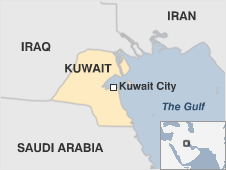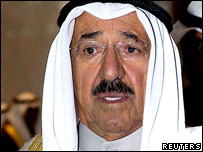 |
Kuwait is a small, oil-rich country nestling at the top of the Gulf, flanked by large or powerful neighbours - Saudi Arabia to the south, Iraq to the north and Iran to the east.
Its oil fields were first exploited in the 1930s, and since the development of the petroleum industry after World War II and independence in 1961, oil has dominated the economy, making up around 90% of export revenues.
Overview
In 1991, the country was the scene of a massive US-led international military campaign to oust Iraqi forces, which had invaded the year before. Operation Desert Storm saw their eventual removal, but Kuwait's infrastructure was left in bad shape and had to be rebuilt. Oil exports stopped for a time.
AT-A-GLANCE
 Politics: The elected parliament has often clashed with the ruling family; the country has faced violence from militant Islamists
Economy: Kuwait is one of the world's leading oil producers
International: Kuwait was invaded and occupied by Iraq in 1990; it served as a springboard for the invasion of Iraq in 2003
|
Twelve years later, Kuwait played host to another massive military presence as thousands of soldiers massed on the Iraqi border for the US-led campaign in 2003 to disarm and oust the Iraqi leader Saddam Hussein. It remains an important transit route for forces and civilians moving in and out of Iraq.
Kuwait was the first Arab country in the Gulf to have an elected parliament. Moves to change the male-dominated political structure culminated in the granting of full political rights to women in 2005.
In 1999 the country's then ruler, Sheikh Jaber al-Ahmad al-Sabah, issued a decree giving women full political rights, but the move was narrowly defeated in the National Assembly.
In May 2005 parliament gave women the right to vote and stand as candidates in elections for the 50-seat National Assembly.
More generally, the growing assertiveness of parliament has led to frequent confrontations with the government. Between 2007-9, three cabinets resigned in as many years amid disputes with the National Assembly.
Kuwait has faced a recent spate of militant violence. Security forces have clashed with Islamist militants, some of whom are alleged to have links with Al-Qaeda. The authorities say extremist groups have plotted attacks on Western targets.
Facts
- Full name: The State of Kuwait
- Population: 3 million (UN, 2009)
- Capital: Kuwait
- Area: 17,818 sq km (6,880 sq miles)
- Major language: Arabic
- Major religion: Islam
- Life expectancy: 76 years (men), 80 years (women) (UN)
- Monetary unit: 1 Dinar = 1000 fils
- Main exports: Oil
- GNI per capita: US $38,420 (World Bank, 2008)
- Internet domain: .kw
- International dialling code: +965
Leaders
Emir: Sheikh Sabah al-Ahmed al-Jaber al-Sabah

Sheikh Sabah has been running day-to-day business for years
|
Sheikh Sabah succeeded Sheikh Saad, who ruled for just nine days after Sheikh Jaber died on 15 January 2006 having spent more than 25 years on the throne.
Parliament voted Sheikh Saad out of office because of his ill health.
Sheikh Sabah had been running Kuwait's day-to-day affairs for years. He became prime minister in 2003 when concern grew about the health of his predecessor in the post, Sheikh Saad.
Observers expect him to maintain Kuwait's pro-Western stance and to pursue reforms; his government appointed Kuwait's first woman minister and he introduced laws which opened the door to foreign investors.
The new emir moved quickly to name his brother as crown prince and his nephew as prime minister. The jobs, traditionally held by one individual, were separated in 2003.
The appointment of the crown prince also broke with the tradition of alternating power between rival branches of the Sabah dynasty.
Born in 1929, Sheikh Sabah was Kuwait's foreign minister for 40 years. Although he had a heart pacemaker fitted in 1999, he is said to be in good health.
His predecessor, the late Sheikh Jaber, suffered several years of ill health following a minor stroke in 2001. He became emir in 1977, having been prime minister from 1965-78 and heir-apparent from 1966. He survived an assassination attempt in 1985 and the 1990 Iraqi invasion.
Members of the ruling family hold most of the key cabinet posts.
Media
Kuwait has some of the most outspoken newspapers in the Arab world, often aggressive in their coverage of politics and the government.
Journalists enjoy greater freedoms than some of their regional counterparts, but restraint is exercised when covering matters relating to the emir and senior royals.
A press law forbids references to God and the Prophet that are deemed insulting. Criticism of the emir, the constitution, the judiciary and the "basic convictions of the nation" is prohibited. Courts can prescribe prison sentences for transgressors.
State-owned television and radio stations operate alongside recently-launched private broadcasters. Satellite dishes are widely used and enable viewers to watch popular pan-Arab TV stations.
Newspaper publishers must have licences from the Ministry of Information. The ministry censors books, films, periodicals and other imported publications deemed morally offensive.
BBC World Service is available on FM in Kuwait City.
Kuwait had 816,700 internet users by 2007, around 25% of the population (InternetWorldStats).
The press
- Al-Watan - private, daily
- Al-Qabas - private, daily
- Al-Rai al-Amm - private, daily
- Kuwait Times - English-language
- Arab Times - English-language
Television
- Kuwaiti TV - state-run, operates four networks and satellite channel
- Al-Rai - first private TV, via satellite
- Flash TV - private
- Al-Watan - private
- Al-Resalah - private, religious
Radio
- Radio Kuwait - state-run, programmes in English and Arabic
- Marina FM - first private radio station, music-based
News agency
-
Kuwait News Agency (Kuna) - in Arabic and English
AFRICA | ASIA-PACIFIC | AMERICAS | EUROPE | MIDDLEEAST | SOUTHASIA
Mauritania Mauritius Morocco Mozambique Namibia Niger Nigeria Republic-of-congo Rwanda Sao-tome-and-principe Senegal Seychelles Sierra-leone Somalia South-africa Sudan Swaziland Tanzania The-gambia Togo Tunisia Uganda zambia Zimbabwe Australia Brunei Burma Cambodia China East-timor Fiji Indonesia Japan Kazakhstan Kiribati Kyrgyzstan Laos Malaysia Marshall-islands Micronesia Mongolia Nauru New-zealand North-korea Palau Papua-new-guinea Samoa Singapore Solomon-islands South-korea Taiwan Tajikistan Thailand The-philippines Tonga Turkmenistan Tuvalu Uzbekistan Vanuatu Vietnam Antigua-and-barbuda Argentina Bahamas Barbados Belize Bolivia Brazil Canada Chile Colombia Costa-rica Cuba Dominica Dominican-republic Ecuador El-salvador Grenada Guatemala GuyanaHaiti Honduras Jamaica Mexico Nicaragua Panama Paraguay Peru St-kitts-and-nevis St-lucia St-vincent-and-the-grenadines Suriname Trinidad-and-tobago United-states-of-america Uruguay Venezuela Albania Andorra Armenia Austria Azerbaijan Belarus Belgium Bosnia-hercegovina Bulgaria Croatia Cyprus Czech-republic Denmark Estonia Finland France Georgia Germany Greece Hungary Iceland Ireland Italy Latvia Liechtenstein Lithuania Luxembourg Macedonia Malta Moldova Monaco Montenegro Norway Poland Portugal Russia San-marino Serbia Slovakia Slovenia Spain Sweden Switzerland The-netherlands Turkey Ukraine United-kingdom Vatican Algeria Egypt Iran Iraq Israel-and-palestinian-territories Jordan Kuwait Lebanon Libya Mauritania Oman Saudi-arabia Sudan Syria Tunisia United-arab-emirates Yemen Afghanistan Bangladesh Bhutan India Nepal Pakistan Sri-Lanka The-Maldives

